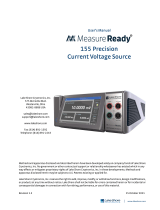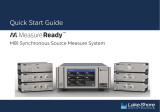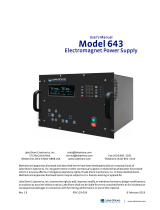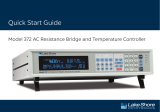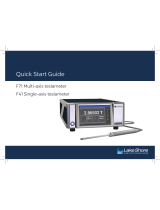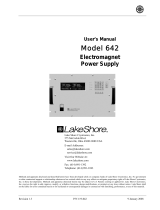Page is loading ...

1 http://www.lakeshore.com/372 Model 372 Quick Start Guide
Quick Start Guide
Model 372 AC Resistance Bridge and Temperature Controller

2Model 372 Quick Start Guide
Safety Precautions
Observe these general safety precautions during all phases
of instrument operation, service, and repair. Failure to comply
with these precautions or with specific warnings elsewhere in
this manual violates safety standards of design, manufacture,
and intended instrument use. Lake Shore Cryotronics, Inc.
assumes no liability for Customer failure to comply with these
requirements.
The Model 372 protects the operator and surrounding area
from electric shock or burn, mechanical hazards, excessive
temperature, and spread of fire from the instrument.
Environmental conditions outside of the conditions below may
pose a hazard to the operator and surrounding area.
Indoor use
Altitude to 2000 m
Temperature for safe operation: 5 °C to 40 °C
Maximum relative humidity: 80% for temperature up to
31 °C decreasing linearly to 50% at 40 °C
Power supply voltage fluctuations not to exceed ±10% of
the nominal voltage
Overvoltage category II
Pollution degree 2
Ground the Instrument
To minimize shock hazard, the instrument is equipped with
a 3-conductor AC power cable. Plug the power cable into
an approved 3-contact electrical outlet or use a 3-contact
adapter with the grounding wire (green) firmly connected
to an electrical ground (safety ground) at the power outlet. The
power jack and mating plug of the power cable meet Underwriters
Laboratories (UL) and International Electrotechnical Commission
(IEC) safety standards.
Ventilation
The instrument has ventilation holes in its top and side covers. Do
not block these holes when the instrument is operating.
Do Not Operate in an Explosive Atmosphere
Do not operate the instrument in the presence of flammable
gases or fumes. Operation of any electrical instrument in such an
environment constitutes a definite safety hazard.
Keep Away from Live Circuits
Operating personnel must not remove instrument covers. Refer
component replacement and internal adjustments to qualified
maintenance personnel. Do not replace components with power
cable connected. To avoid injuries, always disconnect power and
discharge circuits before touching them.
Do Not Substitute Parts or Modify Instrument
Do not install substitute parts or perform any unauthorized
modification to the instrument. Return the instrument to an
authorized Lake Shore Cryotronics, Inc. representative for service
and repair to ensure that safety features are maintained.
Cleaning
Do not submerge instrument. Clean only with a damp cloth and
mild detergent. Exterior only.
Desktop Installation
When installing the instrument in a desktop environment, ensure it
is mounted on a flat, level surface.

3 http://www.lakeshore.com/372 Model 372 Quick Start Guide
Improper Use
If the instrument is used in a manner that is not specified by Lake
Shore, the safety protections provided by the instrument are no
longer guaranteed, and may be impaired.
Introduction
Congratulations on purchasing the world’s most
advanced ultra-low temperature controller.
This guide provides basic information for getting
started with your AC resistance bridge and temperature
controller. For further documentation and information,
please see http://www.lakeshore.com/372.
Items included with the Model 372 AC resistance bridge
and temperature controller:
Model 372 instrument
Model 372 user’s manual
Line power cord
3 sensor input mating connectors, 6-pin DIN
Terminal block mating connector, 6-pin terminal block, for
relays 1 and 2
Terminal block mating connector, 7-pin terminal block, for
heater and analog outputs
Unpacking
1. Inspect shipping containers for external damage
before opening them.
2. Photograph any container that has significant
damage before opening it.
3. Inspect all items for both visible and hidden damage
that occurred during shipment. If there is visible
damage to the contents, contact the shipping
company and Lake Shore immediately
NOTE: Procedures vary slightly with shipping
companies. Keep all damaged shipping materials
and contents until instructed to either return or
discard them.
4. Open the shipping container and keep the container
and shipping materials until all contents have been
accounted for.
5. Check off each item on the packing list as it is
unpacked.
6. Verify that the accessory kit contains the correct
items.
Optional. If you ordered a Model 3726 or Model 3708
scanner, it may be shipped separately.

4Model 372 Quick Start Guide
Keypad operation
See Chapter 4 of the Model 372 user’s manual for
detailed descriptions of each key.
Front panel Rear panel
The rear panel consists of:
1. Scanner control connector
2. Measurement input connectors
3. Control input connector
4. Diagnostic monitor output connector
5. Reference output connector
6. Sample heater, warm-up heater and analog output
terminal block connector
7. Relays 1 and 2 terminal block connector
8. RJ-45 Ethernet interface
9. USB type-B port
10. IEEE-488 interface
11. Line input assembly
3
1
2
4 5 6 7 8 9 10
11

5 http://www.lakeshore.com/372 Model 372 Quick Start Guide
Placement
The Model 372 is an out-of-the-box
benchtop instrument with adjustable
legs to tilt the instrument up slightly
for an improved viewing angle.
Rack mounting
The Model 372 can be installed in an instrumentation rack using the optional
Lake Shore RM-1 rack mount kit. See http://www.lakeshore.com/rack-kit/ for
full details.
NOTE: Ensure that there is 1 in (25 mm) clearance on both sides of the
instrument after rack mounting.

6Model 372 Quick Start Guide
Startup
The steps that follow will take you through basic operation of the Model 372. This is just the beginning of what is
possible with the Model 372, but is a good introduction to the unit.
Basic temperature operation
1. Make the following connections to the Model 372:
a. Power connection using the supplied power cord.
NOTE: Do not turn on the unit until all other connections are made.
b. Sensor connection to the measurement input. This can be a complex step; if this is the first time you have
wired a sensor to either a Model 370 or 372, please see section 3.5 of the Model 372 user’s manual.
This process will be different depending on whether a scanner is also to be used with the instrument. For
guidance on using this additional device, please see section 3.6 of the Model 372 user’s manual. The rest of
these steps assume that the sensor is connected directly to the Model 372, though notes will be made when
something will be different in the case of having a scanner connected.
V+ V– I+ I–
sensor

7 http://www.lakeshore.com/372 Model 372 Quick Start Guide
c. Communications connection to your PC using one of the three different methods available (USB, Ethernet,
GPIB). For this example, USB is used as the connection method.
2. Turn on the Model 372 using the power switch on the back of the instrument. The default settings will display a
resistance reading for the sensor that you have connected. Even if the sensor is at room temperature, you should
see a logical resistance reading. If not, check your connections and begin troubleshooting until a logical reading
is displayed. In the example below, a 10.009 kW sensor reading is shown.

8Model 372 Quick Start Guide
3. To convert this resistance measurement to Kelvin, run the Curve Handler program found at
www.lakeshore.com/products/pages/curvehandler.aspx. Curve Handler can also be found on the Model 372’s
web server that can be accessed when connecting to the instrument via Ethernet (see section 6.4 of the Model
372 user’s manual for details on making this connection). The USB connection will show up as a virtual COM port
on your PC. Select the appropriate COM port from the drop-down menu and click Connect.

9 http://www.lakeshore.com/372 Model 372 Quick Start Guide
4. If you are not able to connect, make sure you have the correct COM port selected. You can do this by checking
Device Manager:
If you are unable to see the Model 372 in this view, you may need to install the USB driver that can be found on
the Lake Shore Software web page: http://www.lakeshore.com/software/.

10 Model 372 Quick Start Guide
5. Load the sensor calibration file that matches the connected sensor by clicking the Open button and navigating
to the appropriate file.
These calibration files can be
found on the USB drive that
was sent with the sensor, or
downloaded from
http://cal.lakeshore.com.
The Model 372 supports both .340
and .curve file formats, with .curve
being the more modern format.

11 http://www.lakeshore.com/372 Model 372 Quick Start Guide
6. Once the curve is loaded, rename the curve (if desired), then click Write To New Location to store this curve on
the Model 372.
7. Click OK to store this curve on
the instrument. You can store
more curves in other locations,
if needed.

12 Model 372 Quick Start Guide
8. Now that your sensor curve
is loaded onto the Model
372, press the InputSetup (7)
button and select Channel 01
(Measurement Input) to enter
the configuration screen for the
main measurement input. If
you have a scanner connected
between the Model 372 and
sensor, you will see other
options than what is displayed
here.
9. Scroll down to Curve and select
the curve that you just loaded
onto the instrument.

13 http://www.lakeshore.com/372 Model 372 Quick Start Guide
10. Scroll down to Preferred Units
and switch this setting to
Kelvin. This step instructs the
instrument to use the assigned
curve to display an equivalent
temperature reading, instead of
the resistance measurement.
11. Press Escape to go back to
the main screen, which will
now display a temperature
reading. You will notice that the
resistance reading is still visible,
displayed as Impedance on
the right side of the screen. For
more information, please see
section 2.5.3 of the Model 372
user’s manual.

14 Model 372 Quick Start Guide
This is just the beginning of what is possible with the Model 372, other activities include:
Excitation Adjustment: see section 4.4 of Model 372 user’s manual.
Heater Setup: see sections 3.7 and 3.8 of the Model 372 user’s manual.
Display Customization: see section 4.3 of the Model 372 user’s manual.
Closed-loop Temperature Control: see section 4.6 of the Model 372 user’s manual.

15 http://www.lakeshore.com/372 Model 372 Quick Start Guide
Ethernet Utilities
When connecting the Model 372 via Ethernet, several
utilities are available on the Model 372’s embedded
web server. Just type the IP address for the Model 372
into your browser to acess these utilities.
See Chapter 6 of the Model 372 user’s manual for
further information on these utilities.
Embedded Curve Handler™
The Embedded Curve Handler™ utility is provided
for uploading temperature curve files to the Model
372. The utility is also capable of reading curves
from the Model 372 and writing them to a file for
storage, or manipulation in a third party program.
The Embedded Curve Handler™ supports standard
Lake Shore temperature curve files in the “.340” file
format, and the Microsoft Excel® “.xls” (Excel® 97
through 2003) file format. Curve files are provided
with calibrated sensors purchased from Lake Shore
in the “.340” file format.
Embedded Chart Recorder
The embedded chart recorder utility is provided to allow
users to easily acquire and chart data from the Model
372. The chart recorder utility can simultaneously chart
and log any combination of sensor readings, control
setpoints, and heater output data from the Model 372. A
basic user interface is also provided for changing control
parameters on the fly while acquiring data, allowing
many basic experiments to be performed without
ever having to write any custom software. Log files
are stored in the Microsoft Excel® “.xls” format for easy
data manipulation. Free utilities are available online for
converting .xls files to comma separated plain text files
(.csv) if Microsoft Excel is not available.

16 Model 372 Quick Start Guide
Contacting Lake Shore
The Lake Shore Technical Support Department is staffed Monday through Friday between the hours of
8:00 a.m. and 5:00 p.m. EST, excluding holidays and company shut down days: https://www.lakeshore.com/support/.
The Lake Shore Forum is also a great place to look for solutions, to post issues, and to share successes:
https://forums.lakeshore.com/.
For further documentation and information, please see http://www.lakeshore.com/372
Lake Shore Technical Support
Lake Shore Cryotronics
Instrument Service Department
575 McCorkle Blvd.
Westerville, Ohio USA 43082-8888
Phone: 614-891-2244
Email: support@lakeshore.com
Web: www.lakeshore.com
Rev. 1.2 PN 119-373 2 June 2023
/






